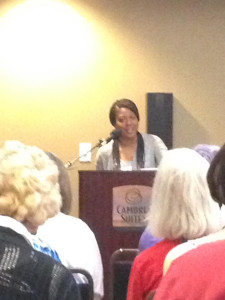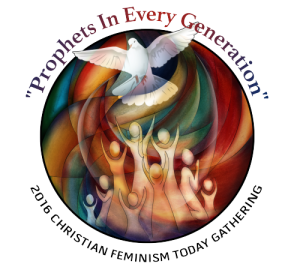“Making Peace,” presentation by Austin Channing Brown at Christian Feminism Today Gathering

 Another prophetic presentation at the 2016 Christian Feminism Today Gathering, June 24-26, was “Making Peace” by Austin Channing Brown. Austin begins by saying that she’s “going to be open to let the Spirit do what She does.”
Another prophetic presentation at the 2016 Christian Feminism Today Gathering, June 24-26, was “Making Peace” by Austin Channing Brown. Austin begins by saying that she’s “going to be open to let the Spirit do what She does.”
Like other speakers at the Gathering, Austin explores the intersectionality of justice issues. She says that she’s “been on a desperate search to figure out what it means to be black and woman.” Her parents gave her the name “Austin” so that her gender wouldn’t be obvious on job applications and she would have more opportunities for interviews. And it is amazing, she says, that people believe racial injustice died with slavery. She laments how often black people are labeled “thugs” and that so many live in poverty.
Austin’s words take on greater urgency in the wake of the horrible violence this past week in Baton Rouge, Louisiana; Falcon Heights, Minnesota; and Dallas, Texas. Read Austin’s powerful words about these events on her blog.
Growing up in a predominately white private school, Austin says she learned little about her black culture. Her teachers, the principal, librarian, and other staff members were white. Chapel services at her school always featured white speakers, the characters in her books were white, and the pictures teachers posted of Jesus were always white. In an article titled “Black Women and the Imago Dei,” published in Today’s Christian Woman, Austin writes of her experience of trying to assimilate into this white culture and of discovering in a black church that she as a black female was indeed created in the divine image.
When she was in college, Austin had a profound experience that began her journey as a racial reconciler. In this video of a presentation she gave at an Allume Conference, Austin tells how she became committed to doing everything she can for racial justice and reconciliation through an event called Sankofa—a three-day bus trip exploring black history sites throughout the South.
At the Christian Feminism Today Gathering, Austin gives powerful testimony to the importance of knowing our historical context. She warns of the dangers of “unknowing and misknowing” our histories, citing the examples of the horrific massacre in Orlando and the racism and misogyny of Donald Trump as “fruit fallen from trees planted long ago.”
 Austin emphasizes our duty to know our own history, to place our own stories in the context of the larger story. We have been unwilling, she says, to “dig into the dirt to see what else is there” in our history. We judge “the Others” without regard to their stories and without regard to the larger structures and histories that shape those stories. Austin challenges us “to refuse ahistorical assumptions about ‘those people,’” and to refuse to give into fear. When we know one another’s stories, we develop empathy for one another across our differences.
Austin emphasizes our duty to know our own history, to place our own stories in the context of the larger story. We have been unwilling, she says, to “dig into the dirt to see what else is there” in our history. We judge “the Others” without regard to their stories and without regard to the larger structures and histories that shape those stories. Austin challenges us “to refuse ahistorical assumptions about ‘those people,’” and to refuse to give into fear. When we know one another’s stories, we develop empathy for one another across our differences.
We must resist our tendency to create enemies because we’re afraid, Austin says. “I had bought into the enemy creation, especially around drugs and black men,” she says. “I bought into the story that three strikes was worthy of ten years in prison. I didn’t get it. I didn’t learn to question the narrative until it hit close to home.” She tells a poignant personal story of reconnecting with one of her cousins who was in prison.
“By giving into fear of being oppressed, we become the oppressor,” Austin declares. “By giving into his fear of being oppressed, Pharaoh becomes the oppressor. We are told to fear black people. We are told to fear losing our jobs. Are we like Pharaoh? When we indulge our unknowing, we act like Pharoah. We have yet as a society to cast off Pharoah.”
Austin points out that Pharoah’s first move was to try to make the midwives do his dirty work of violence and injustice, but through their wisdom they subverted his plan. (Exodus 1:15-22) God continued to raise up women to go against Pharoah’s injustice. Without the partnership of women— Miriam, Pharoah’s daughter and Moses’ mother—there would be no Moses. (Exodus 2:1-10) Without Moses, there would be no Exodus. “Pharaoh was afraid of men. Little did he know…” These women turned Pharoah’s violence into transformation.
 “Prophetic people are not magical unicorns dropped out of the sky today,” Austin declares. “Prophets, who at least tried, have always been there to bring transformation.”
“Prophetic people are not magical unicorns dropped out of the sky today,” Austin declares. “Prophets, who at least tried, have always been there to bring transformation.”
Austin challenges us to think of our own context. Who has been named the enemy? And what are people afraid of? What are people afraid of losing? What control are people afraid of losing? What is the fear? “By creating enemies of entire people groups we dehumanize them,” she says. “We fear the other and become the oppressor ourselves. We create policy around our fears. Our own churches do the same thing. There are people we are afraid of. For example, many churches are afraid of LGBTQ people. In some places, if you publicly identify as LGBTQ, you cannot serve as a leader. Even scarier are the policies no one dares to write down. Our fear dictates policies rather than our love. We must resist the narrative of fear. We must hear it and we must acknowledge it.”
In her conclusion, Austin brings us words of hope: “God is in this moment that is pregnant with possibility. Whether you are dripping with power and privilege or you have little left to lose, what is God stirring in you? Change is going to come, y’all. Praise God that although we live in a world of injustice, this is not the end. We can say no to the Pharaoh that treats one people group different from the other. God offers us freedom from our fears.”
Austin invites us to advocate for the other and to resist the belief we must save ourselves from a scary world. She offers hope that we can have victory from fear and injustice and oppression and death as we march together toward peace and freedom and love. We can transform weapons of violence into instruments of transformation.
These are indeed the hopeful words I need to hear in the midst of injustice and violence. May God bring Her healing, love, justice, and peace to all.
Austin Channing Brown began her journey as a racial reconciler in college with an experience called Sankofa–a three-day bus trip exploring black history sites throughout the South. It was on this pilgrimage that she first connected with her own history and determined to share that experience with others.
Following her undergraduate work, Austin went on to earn a masters degree in Social Justice from Marygrove College in Detroit, MI. From her experience with Sankofa and the foundation of her graduate work, she has directed a short-term missions site on the west side of Chicago, creating interactive opportunities for youth to engage issues of poverty, injustice, and race and worked on staff with Willow Creek Community Church developing strategies and programming around multiculturalism. Currently she serves as Resident Director and Multicultural Liaison for Calvin College, in Grand Rapids, MI.
As a speaker, Austin travels the country throughout the year sharing her message at colleges, universities, conferences, and churches. She has been featured at The Justice Conference, Why Christian? Conference, University of Northwestern, and the CCDA National Conference, to name a few.
In the midst of all of her accomplishments, racial justice and reconciliation, and womanhood have continued to be the core of her message. She writes about these topics on her popular blog and as a regular contributor to Today’s Christian Woman. She has also contributed to Her.maneutics and Relevant. Her work has also been featured on Christian Feminism Today.
May we all “be open to let the Spirit do what She does.” What a great way to look at it, I need to keep asking what I’m afraid of and why. Thank you!